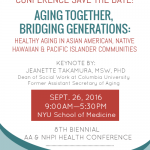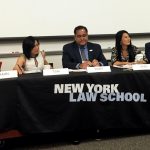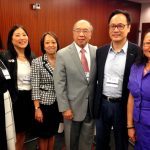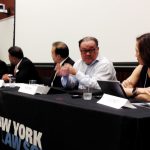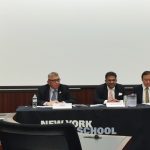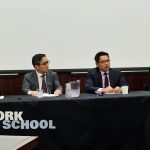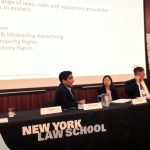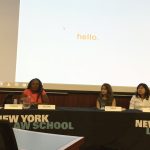NAPABA Names White & Case LLP as Its 2016 Law Firm Diversity Award Recipient
WASHINGTON — The National Asian Pacific American Bar Association (NAPABA) has named White & Case LLP as the 2016 Law Firm Diversity Award recipient. NAPABA created the Law Firm Diversity Award to recognize law firms that actively, affirmatively, consistently, and enthusiastically recruit, retain, and promote Asian Pacific American lawyers to equity partnership and firm leadership.
The award will be presented at the NAPABA Anniversary Gala at the 2016 NAPABA Convention in San Diego, California, on Nov. 5, 2016.
“White & Case is a distinguished industry leader when it comes to workplace diversity,” said NAPABA President Jin Y. Hwang. “To be regularly lauded by your peers as one of the nation’s leaders in diversity practices is extraordinary, and NAPABA celebrates White & Case’s constant devotion to diversity and inclusion in the legal profession.”
White & Case is regularly recognized as a leader in diversity by various prominent benchmarking surveys. The Law360 Diversity Snapshot has ranked White & Case as the most diverse law firm with respect to lawyers of color in the United States in 2016, as well as ranking 3rd among the 10 best law firms for Asian Pacific American attorneys. The firm also currently holds, for the third consecutive year, the No. 1 position on The American Lawyer Diversity Scorecard as the most diverse firm in the U.S. in a 2016 survey of over 220 of the largest and highest-grossing law firms in the country.
Additionally, White & Case scored an eighth consecutive perfect score of 100 percent on the 2016 Human Rights Campaign’s Corporate Equality Index that measures employers’ commitment to LGBTQ workplace issues. The LGBTQ-related policies and practices evaluated by the survey include non-discrimination policies, domestic partner benefits, and diversity training.
For more information, the media may contact Brett Schuster, NAPABA communications manager, at202-775-9555 or bschuster@napaba.org.
2016 Council of Korean Americans National Summit & Gala
2016 Council of Korean Americans National Summit & Gala
The Council of Korean Americans (CKA) is excited to host our annual National Summit & Gala on October 14-15, 2016.
The Summit & Gala Registration Page is now live!
You can purchase tables and individual tickets and help us get the word out about the premier Korean American gathering in Washington by clicking on “Share” on Facebook or Twitter. We offer discounts for individuals who are under 30 or work for a nonprofit organization.
If you are from outside the Washington area, be sure to take advantage of CKA’s room blocks at the W Hotel ($299/night) and the Westin City Center ($175/night). Please note that there is a city-wide convention taking place that weekend and rooms will be in very high demand. Book your room early!
Finally, we are excited to announce that Ambassador Sung Kim will join Lucy Koh and Gideon Yu of the San Francisco 49ers at this year’s gala and awards dinner on Friday, October 14. We look forward to celebrating Ambassador Kim’s remarkable career in foreign service, which includes serving as the first-ever Korean American U.S. Ambassador to South Korea.
We will be sharing more information in the days and weeks to come, including the unveiling of a new Summit website. But we wanted to be sure you register and book your hotels as soon as possible.
Thank you.
See you soon!
Esther C. Lee, Summit Co-Chair & Jinhee Ahn Kim, Summit Co-Chair
Registration – National Asian Pacific American Bar Association
Registration – National Asian Pacific American Bar Association
Early-Bird Registration Deadline | Aug. 26 at 11:59 p.m. PDT
Take part in the largest gathering of Asian Pacific American attorneys, judges, and law students in the country! The 2016 NAPABA Convention in San Diego is one you won’t want to miss. Early-bird registration discounts end on Aug. 26. Register today and save $150 from the advance rate! NAPABA members are eligible for further discounts of $200 off the non-member rate.
Not a member? Become a member for maximum savings!
Prospective Partners Program – National Asian Pacific American Bar Association
Prospective Partners Program – National Asian Pacific American Bar Association
NAPABA Prospective Partners Program
Application Deadline | Sept. 15, 2016
Are you on track for partnership? Apply for the NAPABA Prospective Partners Program!
The Prospective Partners Program (PPP) aims to increase the number of Asian Pacific American partners at major law firms through introduction, mentorship, and relationship building. In anticipation of the program’s seventh year, the PPP is inviting candidate applications and nominations to participate in PPP sessions taking place at the 2016 NAPABA Convention in San Diego, California. For more information and to apply by Sept. 15, click here.
Internship Program – National Asian Pacific American Bar Association
Internship Program – National Asian Pacific American Bar Association
NAPABA provides undergraduate and law students who are interested in the legal profession and advocacy within the Asian Pacific American (APA) community with the opportunity to work in Washington. D.C. The program develops leadership and professional skills and encourages political and civic engagement.
To learn more and to apply follow the link in the title.
Just The Beginning – A Pipeline Organization presents “Equal Justice Under Law: Celebrating the Legacy of Judge Constance Baker Motley”
Thursday, September 15, 2016 – Sunday, September 18, 2016, New York, NY
General Counsel-Who Hires, Who Fires, Who Determines Diversity in Selection of Outside Counsel and How is that Power Wielded?
Thursday, Sept. 15, 2016, 11am – 12:30pm – FREE CLE CREDIT PANEL:
Moderated by George W. Madison, Partner, Sidley Austin LLP; featuring
- Alex Dimitrief, SVP & General Counsel, General Electric;
- Kimberley D. Harris, EVP, General Counsel, NBC Universal;
- Sandra Leung, EVP & General Counsel, Bristol-Myers Squibb Company; and
- Sandra L. Phillips, Group VP, GC and Chief Legal Officer, Toyota Motor North America
(Thurgood Marshall United States Courthouse, 40 Centre St., Courtroom #506)
Historic Reenactment of A Trial: Constance Baker Motley, James Meredith and The University of Mississippi
Thursday, Sept. 15, 2016, 1:45pm – 3:45pm – FREE CLE CREDIT EVENT:
Featuring:
- Judge Denny Chin (2nd Circuit) and
- Kathy Chin, Partner, Cadwalader, Wickersham & Taft LLP
(Thurgood Marshall United States Courthouse, 40 Centre St., Courtroom #506)
Film Premiere, “The Trials of Constance Baker Motley,”
Thursday, Sept. 15, 2016, 4:00pm – 5:30pm FREE
Produced by Joel Motley,
Followed by CLE CREDIT PANEL:
Legacy of Honorable Constance Baker Motley
Moderated by Joel Motley, Managing Director, Public Capital Advisors; featuring:
- Justice Sonia Sotomayor (SCOTUS);
- Judge Laura Taylor Swain (SDNY);
- Judge Anne E. Thompson (DNJ);
- Judge Ann Claire Williams (7th Circuit); and
- Judge Kimba Wood (SDNY).
Each jurist was mentored by Judge Motley.
(Daniel Patrick Moynihan United States Courthouse, 500 Pearl Street, Ceremonial Courtroom)
Voting Rights and the Unfinished Business of Selma
Saturday, September 17, 2016, 10:15am – 11:30am – FREE CLE CREDIT PANEL
Moderated by Gay J. McDougall, Distinguished Scholar-in-Residence, Leitner Center for International Law and Justice at Fordham Law School. Featuring:
- Sherrilyn Ifill, Executive Director, NAACP Legal Defense Fund;
- Deputy Asst. Attorney General Justin Levitt, Department of Justice’s Civil Rights Division;
- Jerry Vattamala, Director, Democracy Program for the Asian American Legal Defense and Education Fund; and
- Nancy Trasande, Senior Counsel, Latino Justice PRLDEF.
(New York Marriott Marquis, 1535 Broadway, Marquis Ballroom, 9th Floor)
Glass Ceilings and Sliding Glass: What Must Women and Minorities Do to Succeed in the Next Frontier of Equal Justice Under the Law?
Saturday, September 17, 2016, 11:30am – 12:30pm – FREE CLE CREDIT PANEL
Moderated by Michele Coleman Mayes, Vice President& General Counsel, The New York Public Library and featuring
- Executive Vice-President & General Counsel Kimberly Harris of NBC Universal and
- Deputy General Counsel Rhonda McLean of Time, Inc.
(New York Marriott Marquis, 1535 Broadway, Marquis Ballroom, 9th Floor)
Register to play in the NAPABA Golf Tournament by Sept. 1
The NAPABA Golf Tournament to Benefit the NAPABA Law Foundation will be held at the beautiful Maderas Golf Club, ranked by Golf Digest as one of the top 100 public golf courses in America. The tournament will be played “shot gun” style in the scramble format with all foursomes teeing off at 8 a.m. Enter to win amazing prizes! The tournament will be immediately followed by an awards reception, scheduled to begin at 1 p.m.
For more information on how to play and sponsor the tournament click here.
AAPI Data Challenge
We are pleased to share that the White House Initiative on Asian Americans and Pacific Islanders and the University of California, Riverside’s AAPIData.com have partnered to launch Elevate: AAPI Data Challenge! We want to hear from the community on novel approaches to interpret data on Asian Americans and Pacific Islanders (AAPIs), particularly data that is broken out by detailed origin (e.g., Chinese, Cambodian, Filipino, etc.).
Background: AAPIs make up the fastest growing racial group and are projected to surpass 50 million by 2060. AAPIs are one of the most diverse racial groups, representing dozens of ethnicities, cultures and migration stories from around the world. Over the last 10 years, there have been significant improvements in the availability of data on AAPIs and while these datasets include information on the detailed origin of AAPIs, they are still underutilized, which is why we’re launching Elevate: AAPI Data Challenge.
Key Date: Submissions will be accepted until Monday, September 5 (Labor Day). They can take on various forms, including infographics, apps, data tables, blog posts, and even animations, videos, and other creative mediums. Challenge details can be found here.
Please help us get the word out! You can also read more about our announcement here on the Angry Asian Man Blog as well as in this article by NBC News.
Thanks for your support and we look forward to seeing your submissions!
Thanks to Everett Lo for sharing this information with AABANY.


